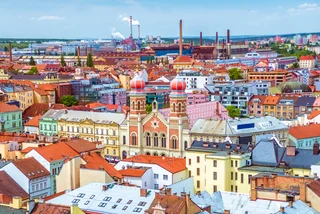The Covid pandemic had a big impact on the livability of cities, and Prague saw one of the sharpest drops, according to the Economist Intelligence Unit’s Global Livability Index 2021.
Compared to the previous list, Prague fell 27 places to end in 72nd place out of the 140 ranked cities. It was the fourth-largest drop of any listed city. Prague’s ranking was significantly impacted by a negative evaluation of its health care system during the pandemic.
The top of the 2021 ranking was dominated by New Zealand, Australia, and Japan, Just two European cities – Zurich and Geneva, both Switzerland – made it into the top 10 at seventh and eighth place.
Auckland topped of the list, replacing Vienna, which held the number one slot since 2018. Osaka, Japan, came in second, and Adelaide, Australia, was third. Tight border controls in New Zealand and Australia have allowed residents to live relatively normal lives, according to the report.
“Owing to border closures and a consequently low Covid-19 case count, New Zealand has been able to keep its theatres, restaurants and other cultural attractions open. Students have been able to continue going to school, giving Auckland a 100 percent score for education. This has allowed the city to move up from sixth place in our autumn 2020 survey to first position in our March 2021 rankings,” the report stated.
New Zealand’s capital, Wellington, has also gained moving from 15th to joint fourth place in the current rankings. Tight border controls in New Zealand and Australia have allowed residents to live relatively normal lives, according to the report.
Europe in general did not fare so well, with no cities in the EU making the top 10. Switzerland is not an EU member.
“Vienna, capital of Austria, occupied the top spot throughout 2018–20 but has slipped down to 12th place for the current survey, following the second Covid-19 wave. In Germany, Frankfurt, Hamburg, and Dusseldorf have seen the biggest falls in ranking of all our 140 cities,” the report states.
Hamburg fell 34 spots to reach 47, while Frankfurt dropped 29 spots to 39th place, and Dusseldorf fell 28 spots to 50th place.
“Canadian cities such as Montreal, Vancouver, Calgary, and Toronto, which have previously scored highly, have also slipped,”the report added.
“The downward movement in rankings for the European and Canadian cities can be attributed to the heightened stress on healthcare resources during the second wave of the pandemic,” the report said.
Not all European cities dropped. Two cities in Spain were among the 10 showing the most improvement. Madrid, rose 25 spots to 19th place and Barcelona was up 22 spots to 16th place. Seven the most-improved cities were in the U.S., and the final one was Melbourne, Australia. The biggest gainer overall was Honolulu, up 46 spots to 14th place.
The lower end of the list saw little change, with Damascus, Syria, in last place, followed by Lagos, Nigeria, and Port Moresby, PNG.
The index evaluates 140 world cities across five areas: stability, healthcare, education, culture and environment, and infrastructure. Data for this survey were gathered between Feb. 22 and March 21, 2021, when cities were at different stages of their battle with the pandemic.












 Reading time: 2 minutes
Reading time: 2 minutes 

























